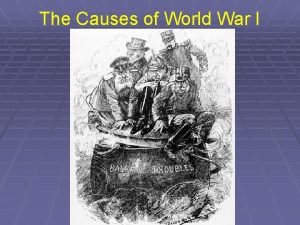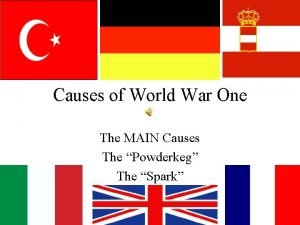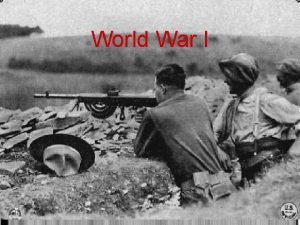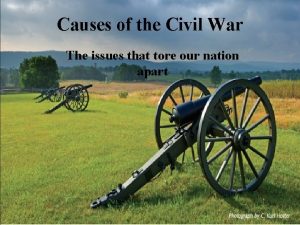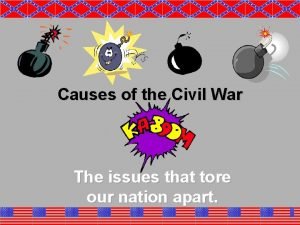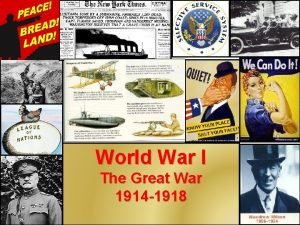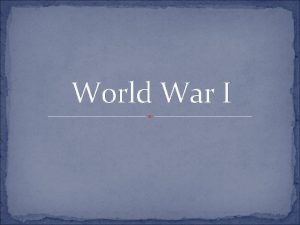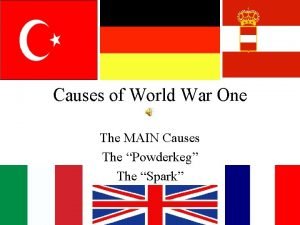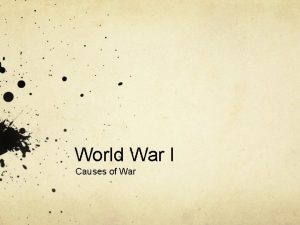World War I MAIN causes of World War





- Slides: 5

World War I MAIN causes of World War I - Militarism, Alliances, Imperialism, Nationalism • US sought neutrality at first - “neutral in fact as well as in name” • The Struggle to Remain Neutral: • Join the Allies? • US traded more with Allies than Central powers. • Most of the American population felt a connection with England than with Germany • Join the Central Powers? • Irish Americans had no love for England However the actions of Germany helped America make up its mind: • Germany’s Unrestricted Submarine Warfare: • Lusitania - sunk on May 7, 1915 • Sussex Pledge - Germany promised not to sink merchant and passenger ships without a warning • Zimmermann Telegram: • Germany encouraged Mexico to attack the US • Promised Mexico it would regain land lost to US in Mexican-American War • Woodrow Wilson ran for election in 1916 using the slogan, “He kept us out of war. ” Six months after his re-election, the U. S. entered WWI

World War I • Americans Join the War • Congress instituted conscription (draft) • American Expeditionary Force (AEF) led by General John Pershing goes to Europe and the US joined fighting in 1917 • Bolshevik Revolution (1917) • Russia became communist, withdrew from WWI • 11/11/18 - armistice to end fighting • The American Fighting Force • 4 million men were in the military during WWI - 10% were African American • Fought in segregated units. Black soldiers were excluded from victory parade in Paris • Influenza killed as many as 50 million after WWI worldwide

World War I • Mobilizing the Economy • War Industries Board: Helped direct production for the military • National War Labor Board: • 8 -hour workday for war workers and overtime • Many unions promised not to strike • Food Administration: • Herbert Hoover - relied on volunteerism to promote war effort • Promoting National Unity • Committee on Public Information (Creel Committee or CPI): • Led by George Creel and “Four Minute Men” • Promoted the war effort on the home front • Espionage and Sedition Acts of 1918: • Made it illegal to criticize the war effort • Upheld by Schenck v. US (1918) - “Clear and Present Danger” ruling

World War I • Great Migrations • Large movement of African Americans from the South to Northern cities (NYC, Chicago, St. Louis) • Red Summer of 1919 - race riots in many northern cities • Mexican Americans moved from farms to cities to work in factories • 100, 000 Mexicans came to the US between 1917 and 1920 • Women’s Voting Rights • National American Woman Suffrage Association (NAWSA): • Carrie Chapman Catt - supported the war effort in the hopes to gain suffrage • National Woman’s Party (NWP): • Alice Paul - picketed the White House, went on a hunger strike • Wilson supported female suffrage, and in 1920, the 19 th amendment was ratified

Catastrophe at Versailles • Wilson’s 14 Points: • Called for: open diplomacy, arms reduction, free trade, sovereignty, etc • Article X - called for the creation of the League of Nations • The Fate of Wilson’s Ideas: • Germany was excluded from the peace conference at Versailles • Germany was punished severely ($33 billion in reparations) • Congress Rejects the Treaty: • “Irreconcilables” - opposed the treaty due to foreign affairs • Henry Cabot Lodge – opposed the League of Nations - would limit Congress’ war making powers • Ultimately, the US did not ratify the Treaty of Versailles or join the League of Nations
